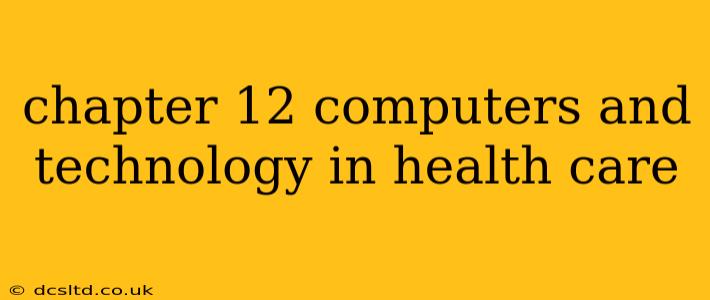The healthcare industry is undergoing a dramatic transformation, fueled by the rapid advancement of computers and technology. This chapter delves into the profound impact of these innovations, exploring their benefits, challenges, and the future of healthcare in the digital age. From electronic health records (EHRs) to telehealth and artificial intelligence (AI), we'll examine how technology is reshaping patient care, improving efficiency, and driving innovation across the medical landscape.
How Has Technology Changed Healthcare?
Technology's influence on healthcare is undeniable. The shift from paper-based systems to digital platforms has revolutionized record-keeping, communication, and diagnostics. Electronic health records (EHRs) provide a centralized, readily accessible repository of patient information, improving coordination of care and reducing medical errors. Telehealth platforms enable remote consultations, expanding access to healthcare for patients in geographically isolated areas or with limited mobility. Medical imaging technologies, such as MRI and CT scans, offer unprecedented diagnostic capabilities, leading to earlier detection and more effective treatment. Surgical robotics enhances precision and minimizes invasiveness, resulting in faster recovery times and better patient outcomes.
What Are the Benefits of Using Computers in Healthcare?
The benefits of integrating computers and technology in healthcare are multifaceted and far-reaching:
- Improved Patient Care: EHRs and telehealth facilitate better communication between healthcare providers, leading to more coordinated and comprehensive patient care. AI-powered diagnostic tools can detect diseases earlier and more accurately.
- Increased Efficiency: Automation of administrative tasks, such as scheduling and billing, frees up healthcare professionals to focus on direct patient care.
- Reduced Medical Errors: EHRs help minimize medication errors and reduce the risk of adverse events through automated alerts and reminders.
- Enhanced Accessibility: Telehealth expands access to healthcare for patients in underserved areas or with mobility challenges.
- Lower Costs: Improved efficiency and reduced errors can lead to cost savings in the long run.
What Are the Challenges of Using Computers in Healthcare?
Despite the many benefits, the integration of technology in healthcare also presents challenges:
- High Initial Costs: The implementation of new technologies, such as EHR systems, can require significant upfront investment.
- Data Security and Privacy: Protecting sensitive patient data is crucial, and breaches can have serious consequences. Robust cybersecurity measures are essential.
- Interoperability Issues: Different healthcare systems may not be compatible with each other, hindering seamless data exchange. Standardization efforts are necessary to address this issue.
- Training and User Adoption: Healthcare professionals need adequate training to effectively utilize new technologies. Resistance to change can also hinder adoption.
- Ethical Considerations: The use of AI in healthcare raises ethical concerns about bias, accountability, and the potential displacement of human workers.
What Are Some Examples of Computer Technology Used in Healthcare?
Numerous technologies are transforming healthcare. Some notable examples include:
- Electronic Health Records (EHRs): Digital versions of patient charts, storing medical history, test results, and treatment plans.
- Telehealth: Remote consultations and monitoring using video conferencing, mobile apps, and wearable sensors.
- Medical Imaging: Techniques like MRI, CT scans, and X-rays provide detailed images of the internal organs and structures.
- Surgical Robotics: Robotic-assisted surgery enhances precision and minimizes invasiveness.
- Artificial Intelligence (AI): AI algorithms are used in diagnostics, drug discovery, and personalized medicine.
- Wearable Sensors: Devices like smartwatches and fitness trackers monitor vital signs and activity levels, providing valuable data for healthcare professionals.
How Is Technology Improving Patient Outcomes?
Technology's impact on patient outcomes is substantial. Early disease detection through AI-powered diagnostics, personalized treatment plans based on genomic data, and remote monitoring via telehealth all contribute to improved health and better quality of life for patients. Minimally invasive surgical techniques, facilitated by robotics, lead to faster recovery times and fewer complications.
What Are the Future Trends in Computer Technology in Healthcare?
The future of healthcare is inextricably linked to technology. We can expect to see continued advancements in AI, machine learning, big data analytics, and the Internet of Medical Things (IoMT). These technologies will further personalize medicine, improve diagnostics, and enhance the efficiency and effectiveness of healthcare delivery. The integration of virtual reality (VR) and augmented reality (AR) will also play a significant role in medical training, surgery, and patient rehabilitation.
This chapter offers a glimpse into the revolutionary impact of computers and technology on healthcare. While challenges remain, the potential benefits are immense, promising a future where healthcare is more accessible, efficient, and effective for all.
